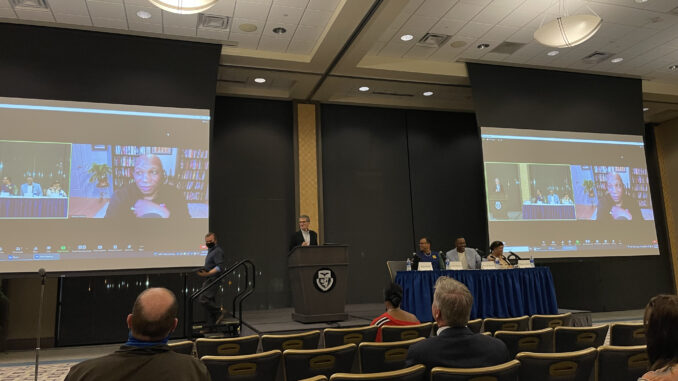
Luke Henne | Sports Editor
Nov. 4, 2021
After Covid-19 halted last year’s planned celebration, Duquesne University welcomed the Negro Leagues Centennial Symposium to the Power Center on Friday.
The symposium, which was held in partnership with the Josh Gibson Foundation, allowed panelists to discuss the importance of the Negro Leagues, both then and now.
Duquesne University President Ken Gormley gave the initial remarks, speaking about the influence that Cumberland Posey Jr., a multi-sport athlete hailing from Duquesne, had on the success of the Negro Leagues.
“[Posey] ultimately owned one of the most-dominant dynasties in professional baseball history: the Homestead Grays,” Gormley said. “He recruited a phenomenal, young sandlot player named Josh Gibson to star on his team.”
In his 14-year career that ended in 1946, Gibson batted .374 and hit 165 home runs, but never got a chance at playing in Major League Baseball due to his skin color. One year later, Jackie Robinson broke the league’s color barrier.
The panel was moderated by Rob Ruck, a historian at the University of Pittsburgh. Ruck opened the forum by discussing the disadvantage presented to Black baseball players from the outset.
“Baseball has never completely escaped America’s racial contradictions,” Ruck said. “Given what African-Americans were facing, [such as] the 1896 Plessy v. Ferguson ruling, the Klan, lynchings, exclusion from baseball wasn’t a critical concern, but it mattered.”
Ruck also described the Negro Leagues as “a sacrifice at the altar of segregation,” in reference to the leagues’ eventual downfalls following Robinson’s aforementioned breaking of the color barrier.
The group of panelists included Claude Johnson, Tarrik Brock, Claire Smith and Howard Bryant (who joined remotely via Zoom).
Johnson, founder of the Black Fives Foundation (an organization committed to preserving the pre-NBA history of Black basketball teams), said that the path to making history stand the test of time is changing the way individuals value it.
“We can use history to make history,” Johnson said. “Be a troublemaker. History doesn’t change. What we do with it does.”
Brock, the first base coach for the Pittsburgh Pirates, watched as Black players on the Pirates struggled to cope with the racial turmoil that stormed across the country during the 2020 season.
He appreciated the swift response of other coaches, who wanted to help Black players like Cole Tucker and Josh Bell share their thoughts and emotions with coaches and teammates who couldn’t relate to what they were going through.
“We asked one candid question: how are you doing?” Brock said.
Smith, a former coordinating editor at ESPN, said that an important part of extending the Negro Leagues’ history has already been taken by the MLB. The league will soon be “turning to the archives of the Black press” in order to recognize the leagues’ statistics as MLB statistics.
Bryant, a senior writer for ESPN, knows that there is still a long way to go not only in sports, but in society, despite the growth the country has made over the past 100 years.
“The fight always continues, especially when you’re only 18% of the population,” Bryant said.

